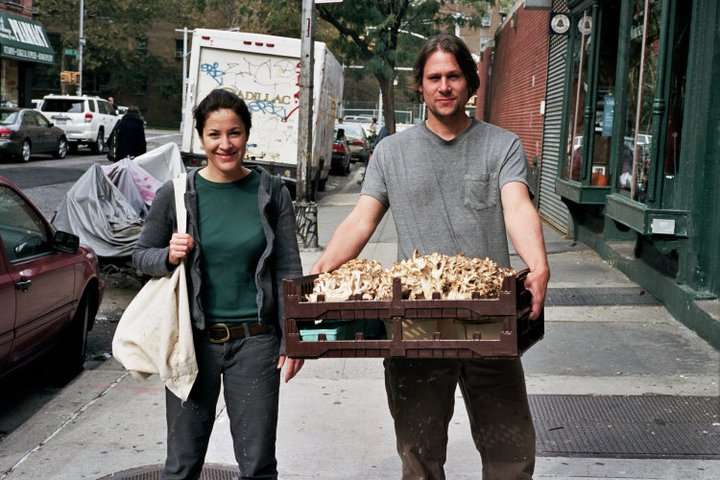 TIFFANY ESTEB AND JASON CORTLAND OF NOW, FORAGERMan finds mushrooms, loses wife
TIFFANY ESTEB AND JASON CORTLAND OF NOW, FORAGERMan finds mushrooms, loses wifeThis serious foodie feature is anchored by its focus on the problematic marriage of a thirty-something couple, both of whom are more than capable of playing a key role in the kitchen of a hip restaurant. The wife would like to do just that, take over a kitchen when she can. The husband, who is a mushroom specialist, is more of a counter-cultural persuasion. He would rather live by foraging alone, if he could, and selling the findable eatable wild American fungi he knows so well, giving up apartment and car if necessary to follow that pursuit. This clash over lifestyle and material goals ultimately causes the somewhat reluctant breakup of the couple, leaving them in the spring with the wife working in a restaurant in Manhattan and the husband housesitting a 35-minute drive from Brooklyn and -- planning to gather some portobellos that afternoon.
The subtitle is "A Film About Love and Fungi." It's really a slow-food and slow-film movie, an intelligent little American indie that's ironic and knowing and notable for the sharp specificity of its people, places, and specialities (casting and settings are tops, and so are details about food), shown off in a series of carefully located scenes.
That the filmmakers know whereof they speak shows all the way through, but there are two excellent sequences in particular that make this film worth watching. And they provide a nice contrast. The first occurs when wife Regina Echevarría (Tiffany Esteb) takes an opportunity found for her by Mas (Almex Lee), the hot chef whose octopus restaurant she's been working in, to become chef of a Basque restaurant "outside of Providence." "That's the whole state," says the often grumpy Lucien (Jason Cortland) when awakened in the middle of the night to hear this news. (Both are of Basque origin.) This sends Regina off to Rhode Island, where the restaurant turns out to be a real dump where hamburger balls with rice and thousand island dressing are key menu items and the "Basque" designation is meaningless. Her brief Rhode Island chef-ing gig is a disaster: the unsophisticated restaurant regulars can't accept her authentic Basque substitutes.
The second great sequence comes when, with Regina away, Lucien decides as it turns colder to drive down to gather wild mushrooms still growing south of New York State. Life is harsh for Lucien away from Regina. In a Maryland forest his afternoon's foraging is robbed from him by a couple of gangsterish Russian rivals (possibly courtesy of the Polish co-production on the film). But real fun happens when -- following another dicey reference from a restaurant friend -- he tries to cater a big party for a fabulously demanding and rich DC lady with a "think tank" husband. The pinioning of the spoiled and the overly well funded here is truly delicious, and as the insufferably bitchy hostess, April Garrison, Gabrielle Maisels is insanely annoying. Casting is spot-on throughout.
Except that in his review in
Variety Jay Weissberg has a point when he claims "zero chemistry between the leads." The couple's splitting up doesn't so much carry a high emotional charge as seem an excuse for the separate sequences they act in thereafter. Consequently Weissberg's also right, good though the episodes are, in saying the film plays "like a compilation of episodes rather than a flowing narrative." Pleasure is to be derived more from the technical details, which are exceptional. Mas's hip restaurant and Mas himself, the unsophisticated Rhode Island restaurant folks and
their setup, as well as all the details of kitchen prep work and mushroom-hunting (plus details of looks, taste, texture, and how to prepare each species) are done with a sense of accuracy and detail such as one rarely sees in a feature film -- not to mention one of those warm fuzzy
Mostly Martha -type food sentiment-fests. But this is so much true that the details may have taken up space that should have gone to character and story. Cortland shows his passion for fungi with what
The Hollywood Reporter calls "additional fungi cinematography, [himself, in addition to writing, starring, and editing] crafting the beautifully immaculate close-ups of choice mycological specimens that punctuate a season-hopping narrative." Clearly this is destined to be the ultimate mycophile movie.
This seems a slightly new kind of "precision" small indie American film that, despite the somewhat downbeat turn of this feature, has great possibilities for precise satire if Cortland and his co-director Julia Halperin want to continue in this vein but lighten it up a bit. And turn to other topics. There is probably room for only one cult feature on mushroom gathering.
This 93-minute American indie film, first feature for the directors, debuted at Rotterdam. It is also included in New Directors/New Films (a series from March 21-April 1, 2012 co-sponsored by MoMA and the Film Society of Lincoln Center), and in was in this connection that it was screened for this review. The ND/NF public screennigs of
Now, Forager (the name humorously adapted from Walt Whitman) :
Friday, March 30th | 9 PM | FSLC
Sunday, April 1st | 4:30 PM | MoMA




